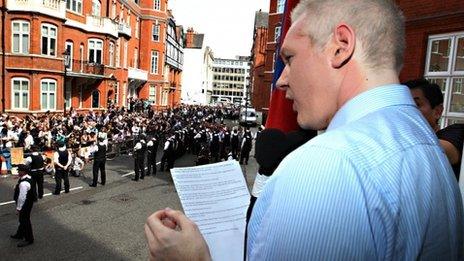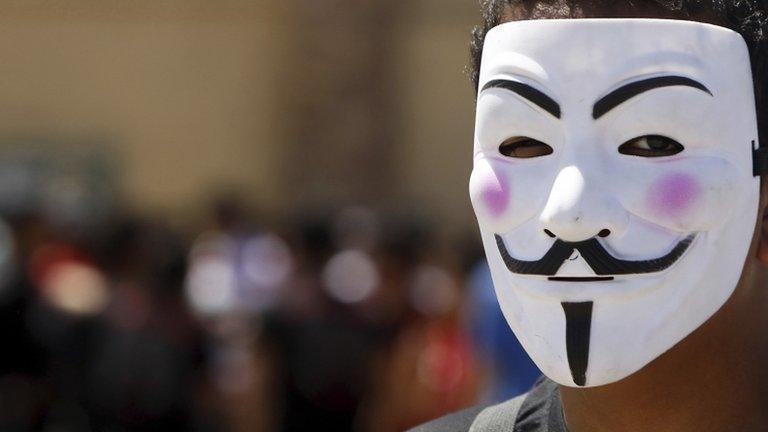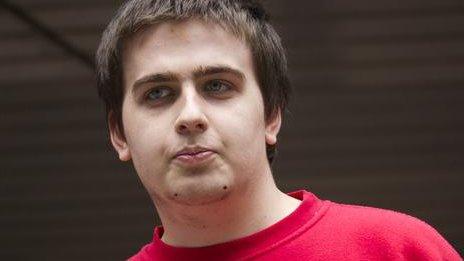Anonymous hits UK government websites in Assange protest
- Published
Ecuadorian president says embassy entry 'would be suicide' for UK
Computer hacking collective Anonymous says it has attacked government websites in retaliation for the UK's handling of the Julian Assange case.
It claimed responsibility on Twitter for the denial-of-service attacks.
Websites affected include the Ministry of Justice and the Home Office.
The Wikileaks founder is staying at Ecuador's embassy in London to avoid extradition to Sweden over sex assault claims, which he denies. He was granted asylum by Ecuador last week.
He has been at the embassy since June and on Sunday addressed crowds of his supporters from the embassy's balcony, thanking Ecuador and other South American countries for their support.
The UK has insisted it is obliged to extradite Mr Assange, 41, and wants a "diplomatic solution", making clear that Mr Assange will be arrested if he leaves the embassy.
But Ecuadorean President Rafael Correa said the UK would be committing diplomatic "suicide" if it tried to enter his country's embassy.
Meanwhile, Swedish prosecutors told the BBC they remain determined to question Mr Assange in Sweden, rejecting a suggestion from Mr Correa that prosecutors could travel to London to question Mr Assange.
'No sensitive data'
Anonymous, a loose collective of computer hackers, has gained notoriety by launching denial-of-service attacks, which flood websites with requests, causing them to operate more slowly or fail, on international government and corporate websites since 2010.
The latest attacks were launched on Monday and most of the affected websites appear to be operating normally now.
A spokeswoman for the Ministry of Justice website said it "had been experiencing some disruption".
A later statement said: "The Ministry of Justice website was the subject of an online attack last night at around 20:00 BST.
"This is a public information website and no sensitive data is held on it. No other Ministry of Justice systems have been affected.
"Measures put in place to keep the website running mean that some visitors may be unable to access the site intermittently."
"We will continue to monitor the situation and will take measures accordingly."
'David beat Goliath'
In an interview with state television, Mr Correa was asked if he thought there was now no possibility the UK authorities would enter the embassy premises to arrest Mr Assange, as they had previously indicated they might in a letter to Ecuadorean officials.
Mr Correa said: "While the United Kingdom hasn't retracted or apologised, the danger still exists."
He said such a course of action would be "suicide for Great Britain because then people could enter their diplomatic premises all around the world and they wouldn't be able to say a thing".
There was very little said on what the next diplomatic step might be regarding removing Mr Assange from the embassy.
But Mr Correa said, if needed, he was prepared to take the issue to the United Nations.
He also said Ecuador was hoping for strong support from a meeting of the Organization of American States on Friday.
"Remember that David beat Goliath. And with many Davids it's easier to bring down a number of Goliaths," he said.
"So we're hoping for clear and coherent backing because this violates all inter-American law, all international law, the Vienna Convention and all diplomatic traditions of the last, at least, 300 years on a global scale."
Sex assault claims
The UK Supreme Court in May dismissed Mr Assange's bid to reopen his appeal against extradition and gave him a two-week grace period before extradition proceedings could start.
The US is carrying out an investigation into Wikileaks, which has published a mass of leaked diplomatic cables, embarrassing several governments and international businesses.
In 2010, two female Wikileaks supporters accused Mr Assange, an Australian citizen, of committing sexual offences against them while he was in Stockholm to give a lecture.
He claims the sex was consensual and the allegations are politically motivated and fears extradition to the US if extradited to Sweden.
- Published25 June 2024

- Published20 August 2012

- Published21 August 2012

- Published2 August 2012

- Published27 June 2012

- Published14 June 2012
